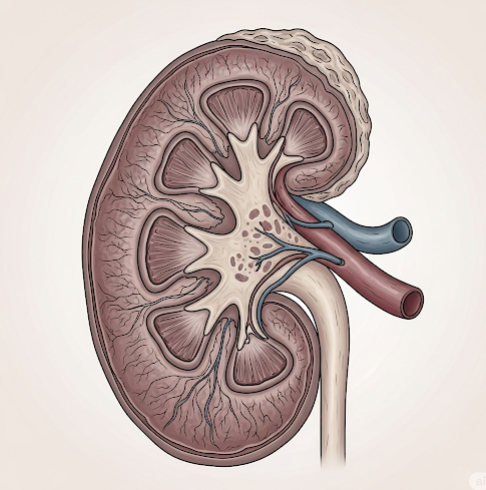Overview
Kidney failure, also known as renal failure, occurs when the kidneys lose their ability to effectively filter waste products, excess fluids, and toxins from the blood. This serious condition can develop suddenly (acute kidney failure) or gradually over time (chronic kidney disease progressing to end-stage renal disease). Untreated kidney failure leads to dangerous buildup of toxins, electrolyte imbalances, and life-threatening complications. Korea’s healthcare system provides comprehensive nephrology care, advanced dialysis services, and kidney transplantation programs that offer patients effective management and improved quality of life.
What Is Kidney Failure?
Kidney failure is the condition where kidneys fail to perform their vital functions of blood filtration, fluid balance, and waste excretion. It is classified into:
- Acute Kidney Injury (AKI): Sudden and rapid loss of kidney function, often reversible with timely treatment.
- Chronic Kidney Disease (CKD): Gradual loss of kidney function over months or years, potentially leading to permanent kidney failure or end-stage renal disease (ESRD).
When kidneys fail, harmful substances accumulate in the body, causing symptoms and complications that affect multiple organ systems.
Symptoms
Symptoms vary depending on the stage and cause but may include:
- Fatigue and weakness
- Swelling in the legs, ankles, or around the eyes due to fluid retention
- Decreased urine output or changes in urination patterns
- Shortness of breath from fluid overload
- Nausea, vomiting, and loss of appetite
- Persistent itching and dry skin
- High blood pressure difficult to control
- Confusion or difficulty concentrating
- Muscle cramps and seizures in severe cases
Causes
Kidney failure can result from numerous causes including:
- Diabetes mellitus, the leading cause of chronic kidney failure worldwide
- Hypertension (high blood pressure) causing kidney damage
- Glomerulonephritis (inflammation of kidney filtering units)
- Polycystic kidney disease and other genetic disorders
- Prolonged obstruction of urinary tract (e.g., kidney stones, enlarged prostate)
- Severe infections or sepsis
- Certain medications or toxins damaging kidneys
- Acute injury such as trauma or severe dehydration
Risk Factors
- Diabetes and uncontrolled blood sugar levels
- Chronic hypertension
- Cardiovascular diseases
- Family history of kidney disease
- Older age and certain ethnic backgrounds
- Smoking and obesity
- Repeated urinary tract infections or kidney stones
- Use of nephrotoxic drugs such as NSAIDs or some antibiotics
Complications
- Fluid overload leading to heart failure and pulmonary edema
- Electrolyte imbalances causing cardiac arrhythmias
- Anemia from decreased erythropoietin production
- Bone disease due to disturbed calcium and phosphorus metabolism
- Uremia causing systemic toxicity and neurological symptoms
- Increased susceptibility to infections
- Cardiovascular disease, the leading cause of death in kidney failure patients
Prevention
- Control of diabetes and hypertension through medication and lifestyle changes
- Avoidance of nephrotoxic substances and medications
- Regular kidney function screening for at-risk individuals
- Maintaining a healthy diet and weight
- Prompt treatment of infections and urinary obstructions
- Staying hydrated and avoiding excessive use of painkillers
Treatment Options in Korea
Korea offers state-of-the-art facilities for kidney failure management including:
- Medical Management: Optimizing control of blood pressure, blood sugar, and other underlying causes to slow progression.
- Dialysis:
- Hemodialysis: Using a machine to filter blood outside the body, typically performed several times a week at dialysis centers.
- Peritoneal Dialysis: A home-based therapy using the peritoneal membrane to filter blood internally.
- Kidney Transplantation: Korea has advanced transplant programs with high success rates, offering patients the best chance for long-term survival and quality of life.
- Supportive Care: Nutritional counseling, anemia treatment, and management of complications by multidisciplinary teams.
- Innovative Therapies: Korean research centers are involved in developing regenerative medicine and novel drugs to improve kidney repair and function.
Korea’s nephrology experts emphasize early detection, patient education, and integrated care to improve outcomes for individuals living with kidney failure.













